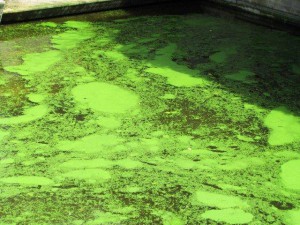A joint research team from the Chemical and Biological Sciences Department, Universidad Autónoma de Sinaloa, and the Chemical Engineering Department of Universidad Michoacana de San Nicolás de Hidalgo, both located in Mexico, have discovered a way to produce biofuels from algae that also removes CO2 emissions from the environment. The findings were published in a recent edition of Industrial & Engineering Chemistry Research journal.

Researchers developed a mathematical model to calculate how to efficiently produce biofuel from algae. Photo Credit: MiguelUrbelz/iStock/ThinkStock
To address the issue of cost and energy barriers to the success of algae-based biorefineries, Eusiel Rubio-Castro and colleagues developed a mathematical model to determine the optimal design of an algae-based biorefinery where flue gases from different industrial facilities are used as raw materials. A basic algae biorefinery just needs nutrients, water, sunlight and CO2 to operate.
The team developed a mixed integer non-linear programming (MINLP) model and applied it to a case study in Mexico. Their model determined that using flue gases as a source of CO2 reduced costs associated with the algae-growing stage of the process — the most expensive part — and reduced all other costs by almost 90 percent. Using water recycled within the biorefining process also reduced fresh water needs by about 83 percent. However, as the technology stands, the researchers say that the costs are still too high to justify an algae-based biorefinery on its own. Instead, they say that producing cleaner, algae-based fuels should be seen as a necessary expense in the global effort to reduce and capture carbon emissions.

